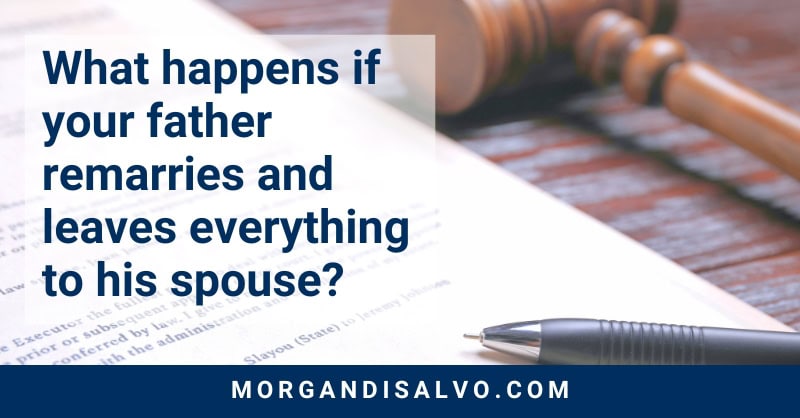Question: What happens if your father remarries and leaves everything to his spouse? My father had a Will that left everything to his spouse. The Will stated that if she died first, my brother and I would divide everything 50/50. My dad passed away first. My stepmother was sick with cancer at the time; however, she didn’t tell my brother and me. She passed away 78 days later. Will everything go to her children?
Loraine’s Answer: Where your father’s assets will go depends on how the assets passed at his death, what his Will said, and what your stepmother’s own Will or other estate planning documents (if any) say. There are several important questions to answer:
- Is there a minimum survival period imposed by your father’s Will? If so, did your stepmother live at least that long? If your father had a Will that is written so that your stepmother had to outlive him by more than a minimum period of time before she would receive assets, then, if she did not live long enough, assets may not have passed to her under the Will. So, one important question is whether his Will imposed a minimum survival period and if so, what it was. (A common survival period for a surviving spouse is 60 days; however, in some cases a survival period can be shorter or longer than 60 days.)
- Are your father’s assets controlled by his Will, or are they controlled by beneficiary designations or rights of survivorship (in many cases, some assets will be controlled by the Will, other assets will be controlled by beneficiary designations, and still other assets will be controlled by rights of survivorship)? Beneficiary designations and rights of survivorship, which generally do not have minimum survival periods, generally override anything in a Will, and often apply to a lot of assets at a person’s death. If beneficiary designations apply to certain assets, what do those beneficiary designations say? If your stepmother was a surviving joint tenant on an asset, such as a joint bank or brokerage account or a jointly owned parcel of real estate, then she would have received outright ownership of those assets immediately after your father’s death even if she did not outlive a minimum survival period imposed by his Will. If she was designated as the beneficiary of a given asset such as life insurance or a 401(k) account or IRA, then she also would have received ownership of those assets at his death even if there were a minimum survival period in his Will. It will be critical to figure out what your father owned, how he owned it, and what his estate planning documents say before you can know what will happen to his assets.
- For assets your stepmother received, did she have a Will or were her assets held under a beneficiary designation or a right of survivorship? Your stepmother’s own estate planning documents will determine how her assets will pass, including any assets she received outright from your father. In situations involving blended families, couples sometimes have their Wills or other estate planning documents drafted to provide for all of their combined children no matter which member of the couple dies first. For example, your stepmother’s Will might mirror your father’s Will and say that at least some portion of her assets go back to his children after her death. Similarly, she could have designated your father’s children as beneficiaries under beneficiary designations on her assets It’s certainly not guaranteed, but you could be surprised.
There are many variables that affect what happens to assets when someone passes away. You’ll need to try to get information about both your father’s estate planning and your stepmother’s estate planning. You should consider hiring a probate attorney to help you, especially if your stepmother’s family is not cooperative in providing information or if you think that you may want to make any kind of challenges.
Key Estate Planning Takeaways: A person’s Will, beneficiary designations, and other estate planning documents will dictate what happens to their assets at their death, including any assets that the person received outright from a predeceased spouse. If a person in a blended family wants to ensure that assets can benefit the person’s surviving spouse but still eventually benefit the person’s own children, then the person needs to ensure that his or her estate planning does not leave assets outright to the person’s spouse if the person dies first. However, the person’s spouse could still decide to benefit the person’s own children if the spouse survives.
This “Q&A with Loraine” blog series is inspired by answers from Morgan + DiSalvo Partner Loraine DiSalvo to actual user questions posted by individuals on www.avvo.com. This blog is a more in-depth response than can be given on their site under their character limits for answers. To view the original question and Loraine’s original response, click here.




